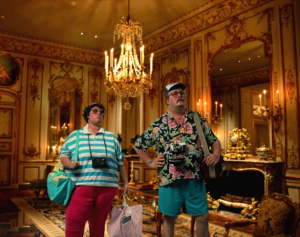For American invitees to the wedding of his Royal Highness, the Prince of Wales and Ms. Meghan Markle at the chapel in Windsor Castle, these careful words of advice are hereinafter given to provide some pointers to avoid gaffes on your part.
“Hi, buddy” is not considered a proper greeting to the Prince, nor “Hi, there” to Meghan. With the British, first names are not used at once as if you are drinking pals. In the case of the Prince and Meghan, this means you cannot address them as “Harry” and “Meghan” (let alone, “Har” and “Meg”).
If the conversation becomes boring, it is not considered normal behavior to begin fingering objects at the reception and checking their bottoms for prices. An occasional nod of the head will give the impression of paying attention. Appraising the women’s legs is a no-no.
When tea is served, as it invariably is, it will be brought in a cup. Nor should the saucer which accompanies the cup be considered an unnecessary accoutrement; the saucer should not be waived away with distain, nor should you say you prefer “a brew” instead. The little finger should not be pointed (and certainly never at the prince or the bride) but curled in raising the cup, and the index finger should not be extended in lieu thereof, even in emphasizing a conversational point.
Actually, points are not emphasized in England, rather they are nudged into place. Napkins are also served, and the mouth should be patted, never swiped at. Sweeping gestures are frowned on. The last sweeping gesture made by an Englishman was that of Sir Walter Raleigh in spreading his cloak for Queen Elizabeth (the First) to walk on, and he subsequently lost his head.
The English are a reticent race. Do not pepper them with a lot of rapid-fire talk. On the other hand, you may doze until they finish their sentences, and mumbling is also tolerated, which facilitates answering them if you are in the midst of a tart which the English dote on. Do not ask for a Big Mac instead.
The English cannot abide shouting, so your normal speaking voice must be modulated. An alternative technique is to stand further back from your conversant than you do in the U.S. This can only enhance your status, as the English frown on familiarity. Do not worry that you will not be heard, for many Englishmen are equipped with ear-trumpets, a habit no doubt stemming from their use as mouth-trumpets during fox hunts. Touching the English when speaking with them is absolutely forbidden. This touchiness derives (in the case of males) from their public school days, in which such physicality was regarded as a discreet overture.
When presented to an Englishman, especially if titled, it is not considered proper to thereupon inquire as to his salary or the cost of his residence, nor even (if it is not abundantly clear) what he does for a living. Many titled Englishman do nothing for a living, nor are they expected to. Caveat: If you are presented to a Lord, do not commence to mention your own favorite schemes for investment. Don’t try to purchase London Bridge as a souvenir.
Finally, a general rule: when in doubt, adopt passivity. This may prolong your visit unintentionally a few weeks until your hosts take the initiative, but they will regard you forever after as the most decent of chaps. A final suggestion, do not call the Queen, “Queenie.”
This guest article was submitted by a genuine American







